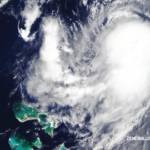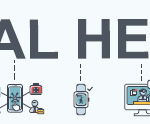This ACR initiative aims to create a common language to define key data elements for rheumatology and make it easier to compare patient data across EHR systems.


Allison Plitman, MPA, Tom Tack & Jason Liebowitz, MD |
This ACR initiative aims to create a common language to define key data elements for rheumatology and make it easier to compare patient data across EHR systems.

Editor’s note: As states prepare for Hurricane Milton, at least 223 people have died and hundreds are still unaccounted for in the destruction wrought by Hurricane Helene on Sept. 26. North and South Carolina, as well as Tennessee, were hard hit, and the U.S. medical system is being tested. Headlines include: “Helene Nearly Turned a…
The Department of Health & Human Services has released a final rule that would penalize healthcare providers who interfere with a patient’s access to, exchange or use of their electronic health information.

Hurricane Ida intensified in the last two weeks of August 2021, battering the Cayman Islands and Cuba before hitting the Louisiana coast as a Category 4 storm just before Labor Day weekend.1 At landfall, Ida blasted southern Louisiana with maximum sustained winds of 150 knots, then turned in a north-northwestern direction to hit the New…

Leslie Mertz, PhD |
When it comes to experiencing burnout, time spent in an electronic health records (EHR) system appears to be only a minor contributing factor. Although clinicians and other healthcare professionals may log many hours at the keyboard putting information into the EHR, other factors likely play a bigger role in the workplace exhaustion and feelings of…

Example 1 A cardiologist contacts a rheumatologist concerning a lupus patient. The rheumatologist sees the patient four weeks later for a complete examination. A 20-minute call is initiated to review the findings and the patient’s chart with the cardiologist. After the call is completed, the rheumatologist completes a verbal and written report to the patient’s…

The 21st Century Cures Act (Cures Act) became law on Dec. 13, 2016, and emphasized interoperability in the exchange of healthcare information between healthcare providers, health information entities and patients. The Cures Act underscored unimpeded access to patient electronic health information (EHI) upon request, in a manner that is secure and updated automatically, and prohibits…
Allison Plitman |
In September 2020, the ACR received a $7 million grant for a four-pronged SLE approach that seeks to address gaps and inequities in SLE through physician education, medical school outreach, pediatric support and disease management.

Navigating the healthcare system and its processes can seem overwhelming to patients. If patients understand why their clinician recommended something, know how and when to take medications, and why they shouldn’t skip a dose—or 10—they may not feel so out of control. Sharing examination notes with patients can be helpful to many patients who struggle…

Mary Beth Nierengarten |
Late-night gatherings; long hours of avid discussion weighing the merits of resolution quality, light, hues and tones; and camaraderie among members forged through a shared interest in maintaining the highest fidelity to their craft and profession—these are among the vivid memories of those who participated in the early years of building what is today known…